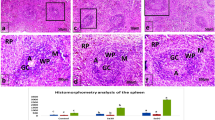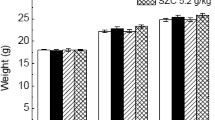Abstract
This study was carried out to evaluate the dose-effects of ingestion of Maharishi Amrit Kalash 4 (MAK 4), an ayurvedic food supplement, on the immune function in female inbred BALB/c mice. Superoxide anion (O2) production of peritoneal macrophages and the response of spleen cells to concanavalin A (Con A) were examined in mice given MAK 4 by gastric intubation of an aqueous emulsion at the dose of 10, 50, 100 or 200 mg/kg once a day for 20 days. Glucose consumption of peritoneal macrophage in the MAK 4-treated mice at the doses of 10 and 50 mg/kg after not only 24-hour but also 48-hour incubations were significantly high compared with the control group. Glucose consumption of peritoneal macrophages in the MAK 4-treated mice at the doses of 100 and 200 mg/kg after 48 hours of incubation were significantly lower than that of the control group. O2 production in the absence of a stimulator was significantly enhanced in the MAK 4-treated groups at the doses of 10 and 50 mg/kg. On the other hand, O2 production in the presence of a stimulator was significantly high in the MAK 4-treated groups at the doses of 10 and 50 mg/kg, and was significantly low in the MAK 4-treated groups at the doses of 100 and 200 mg/kg compared with that in the control group. Activities of acid phosphatase in the peritoneal macrophages were significantly low in the MAK 4-treated groups at the doses of 100 and 200 mg/kg compared with those in the control group. Activities of β -glucuronidase (GLU) and lactate dehydrogenase (LDH) in the peritoneal macrophages were significantly increased in the MAK 4-treated mice at the doses of 10 and 50 mg/kg. GLU and LDH activities of peritoneal macrophages in the MAK 4-treated mice at the doses of 100 and 200 mg /kg were significantly low compared with those in the control group. MAK 4 did not enhance spontaneous splenic lymphocyte proliferation at any dose in mice. Stimulation indices in the MAK 4-treated groups at all doses were significantly higher than those of the control group. These results indicate that 10 and 50 mg/kg per day might be appropriate doses to enhance not only macrophage function but also lymphocyte responsiveness for the gastric intubation of MAK 4 in mice.
Similar content being viewed by others
References
Zaman H. The south-east Asia region. In: Bannerman RH, editor. Traditional Medicine. Geneve : World Health Organization 1974 : 231–9.
Glaser JL. Maharishi Ayurveda: An introduction to recent research. Mod Sci Ved Sci 1988 ;2 : 89–108.
Sharma HM, Dwivedi C, Statter BC, Gudehithlu KP, Abou-Issa H, Malarkey W, Tejwani GA. Antineoplastic properties of Maharishi-4 against DMBA-induced mammary tumors in rats. Pharmacol Biochem Behav 1989;35: 767–73.
Inaba R, Sugiura H, Iwata H. Immunomodulatory effects of Maharishi Amrit Kalash 4 and 5 in mice. Jpn J Hyg 1995 ;50: 901–5.
Inaba R, Sugiura H, Iwata T, Tanaka T. Dose-dependent activation of immune function in mice by ingestion of Maharishi Amrit Kalash 5. Environmental Health and Preventive Medicine 1997 ;2: 35–39.
Adachi Y, Ohno N, Ohsawa M, Oikawa S, Yadomae T. Changes of biological activities of (l-3)-β-D-glucan from Gli-fola frondosa upon molecular weight reduction by heat treatment. Chem Pharm Bull 1990 ;38: 477–81.
Barbara BH, Stanley MS. Selected Methods in cellular immunology. San Francisco: Freeman WH and Company, 1980, (Japanese translation by Imai K, Kawaguchi S, Harada T. Tokyo : Rikogakusya, 1982 : 15–16).
Sugiura H, Maeno H, Ueya E, Inaba R, Iwata H, Nishida H. Effects of ingestion of “BON-NARINE” on immune functions in mice. Jpn J Hyg 1994 ;49: 914–23.
DiGregorio KA, Cilento EV, Lantz RC. Measurement of super-oxide release from single pulmonary alveolar macrophages. Am J Physiol 1987 ;252: 677–83.
Sugawara I, Ishizaka S, Tsuji T, Nishiyama T. MTT Assayrapid colorimetric assay applicable to celluar proliferation and cyto-toxicity assays. J Clin Exp Med 1984 ;128: 733–5.
Yamazaki M, Tsunawaki S. Anti-tumor effect by leukocyte-derived active oxygens(in Japanese). Protein, Nucleic Acid and Enzyme 1988 ;33: 3031–6.
Ryan JL, Glode LM, Rosenstreich DL. Lack of responsiveness of C3H/HeJ macrophages to lipopolysaccharide: the cellular basis of LPS-stimulated metabolism. J Immunol 1979 ;122 : 932–5.
Allison AC, Davies P, Page RC. Effects of endotoxin on macrophges and other lymphoreticular cells. J Infect Dis 1973;128: S212–9.
Smith KA. Interleukin-2: inception, impact, and implications. Science 1988 ;240: 1169–76.
Nowell P. Phytohemagglutinin: an initiator of mitosis in cultures of nomal human leukocytosis. Cancer Res 1960 ;20 : 462–6.
Kaneko Y, Yatsuzaka M, Endo Y, Oda T. Activation of human lymphocytes by tumor promotor teleocidin. Biochem Bio-phys Res Comm 1981 ;100: 888–93.
Collins M, Rosengurt E. Stimulation of DNA synthesis in murine fibroblasts by the tumor promotor teleocidin: relationship to phorbor esters and vasopressin. Biochem Biophys Res Comm 1982;104: 1159–66.
Author information
Authors and Affiliations
Additional information
An erratum to this article is available at http://dx.doi.org/10.1007/BF02931242.
Rights and permissions
About this article
Cite this article
Inaba, R., Sugiura, H., Iwata, H. et al. Dose-dependent activation of immune function in mice by ingestion of Maharishi Amrit Kalash 4. Environ Health Prev Med 2, 126–131 (1997). https://doi.org/10.1007/BF02931978
Issue Date:
DOI: https://doi.org/10.1007/BF02931978




